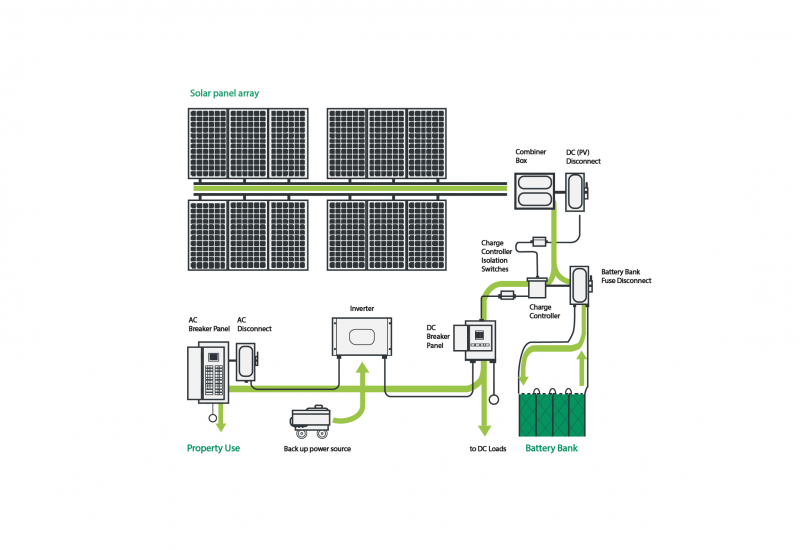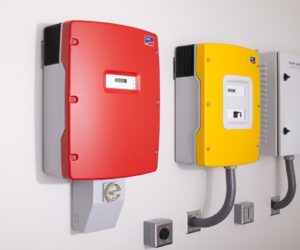A Guide to Off Grid Solar
The idea of running your home completely free of utility companies is an attractive one. Many homeowners have chosen to go this route, seeking the independence, sustainability, and cost savings that an off-grid solar system can provide. Of course, you may be forced to go off-grid to due to the remote location of your property. Going off-grid means that 100% of your electricity will be derived through the collection of solar energy and any back up resources.
Off Grid Solar: How does it work?
Off-grid Solar Systems – often referred to as Stand-alone power systems (SAPS) – work by generating electricity from solar panels and using it to charge a solar battery via a charger controller. That electricity is then converted using an inverter so that it can power your home or business appliances. By storing the electricity in a solar battery, it is possible to run your home exclusively from solar energy, even at night or during times when there is less than optimal sun exposure.
Components of an Off Grid Solar System
For an off-grid solar power system to work effectively in the average home, you will require a few pieces of equipment. Depending on the size and the scale of your solar power system set-up, your individual needs are likely to be different from other off grid system owners, but there are some main pieces you will definitely need to get up and running.
- Solar Panels
As the name suggests, solar panels are an obvious first ingredient. The precise size and production capabilities of your individual solar panel array will depend on the amount of available sunlight in your region, the usable space of your roof, and your energy consumption needs.
- Solar Batteries
A solar battery will also be necessary, to allow your home to continue to run after the sun goes down. Throughout the day, your solar storage device will charge as your panels generate excess electricity. Rather than simply losing out on all of that available solar power, a battery enables you to keep it for use at a later time. Depending on your energy needs, you may have a single battery, or even a battery bank.
- Solar Inverters
In order to convert the direct current (DC) collected by your solar panel array into the alternating current (AC) required to run most of your common household appliances and electronics, your solar power system will also need a solar inverter – sometimes referred to as a solar converter or a PV inverter. For the purposes of an off-grid system, you will likely use a stand-alone inverter, though there are a few options when it comes to set-up.
- Solar Charge Controller
The solar charge controller or battery charger is vital to the health of your battery. The controller regulates the voltage and current that your solar battery receives, to prevent overcharging and damage.
- Alternative energy source
It may be worth considering an alternative source of energy as back up for your system. This can be especially handy during the depths of winter when solar production is at its lowest. Many owners who use off-grid systems combine them with a generator that can power some of their homes’ electricity needs.
Going off grid: is it right for you?
If you have the option of going off grid, it’s worth considering the pros and cons as opposed to staying connected to the grid. Of course, you may not have the option and have to use a off-grid system in order to power your home. If you want to see what size system and battery bank you would need to take your home off the grid, you can use our purpose built off grid calculator.
- Environmental Impact
There’s no doubt that solar energy is much cleaner and eco-friendly than using fossil fuelled power. Going green is one of the main draws for a grid-free lifestyle, and using a renewable resource like solar power is a perfect way to lower your carbon footprint. However, your excess, clean, solar generated energy is not used by anyone else. It goes to waste. If you are connected to the grid, this green energy can be exported back into the grid and then used by someone else.
- Energy Independence
Another big advantage of going off grid is that you achieve 100% independence from electricity retailers. You will not pay anything for your electricity costs, and you are 100% insured against rising energy prices. Your system also protects you from grid-tied power failures or blackouts.
The flipside is, you are truly on your own. If your power system is knocked offline by equipment failure or inclement weather, the utility company isn’t coming to your aid. That means it’s up to you to make sure your equipment meets your needs (checking the capacity for storage as well as our output, to ensure your solar power system can meet your demands), and to keep that equipment in working order.
How can I get one?
That’s where we can help! We can provide free quotes and have expert off-grid installers discuss and recommend systems for your property. Costs will vary, depending on your individual needs, but we’ll help you get the quotes you need to determine what kind of off grid solar power system you can build to fit your budget and needs.


